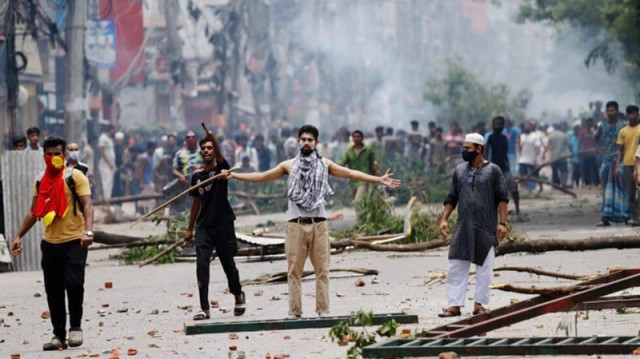Troops impose uneasy calm on Dhaka
BD protests pause after top court scraps job quotas

Bangladesh Prime Minister Sheikh Hasina blamed her political opponents for deadly violence that swept the country during recent student-led protests against quotas in government jobs, stating on Monday that a curfew would be lifted when the situation improved.
Streets appeared calm in Bangladeshs capital on Monday, a day after the Supreme Court agreed to scrap most government job quotas that had angered student-led activists and led to deadly protests.
When arson terrorism started, the protesting students said they were not involved in it, Hasina said in an address to business leaders in the capital Dhaka, her first comments since her government ordered a curfew late on Friday.
We were forced to impose a curfew to protect the lives and property of the citizens. I never wanted it, she said. We will lift the curfew whenever the situation gets better. Hasina blamed the main opposition Bangladesh Nationalist Party and the Jamaat-e-Islami party and its student wing for the violence that started last week.
Late on Sunday, protesters gave Bangladeshs government 48 hours to meet a string of new demands, including a public apology from Prime Minister Sheikh Hasina for the violence, and the restoration of internet connections disrupted in the unrest.
But on Monday, most appeared to be obeying a curfew in cities that had seen regular demonstrations after a high court in June reinstated old quotas that reserved many state jobs for descendants of freedom fighters and other groups.
At least 147 people have died in the violence, according to information from hospitals, while a police spokesperson said at least three policemen were killed and more than 1,000 injured. Dhaka police have arrested 516 people for involvement in destructive attacks, spokesperson Faruq Hossain said.
A public holiday declared over the last two days was extended to Tuesday, according to a government notification. Normalcy will return within one or two days, Home Minister Asaduzzaman Khan told reporters.
Army tanks were seen stationed at several places in the streets of Dhaka, the capital, while armed security patrols directed the few motorists who ventured out.
The Supreme Courts Appellate Division on Sunday ruled in favour of an appeal from the government, overturned the lower courts decision and scrapped most of the quotas, directing that 93% of government jobs should be open to candidates on merit. Hours after that ruling, the Anti-Discrimination Student Movement issued a statement demanding the government reopen campuses and end restrictions imposed as protests raged. It also called for the resignation of some ministers and university officials and the dismissal of police officers deployed in the areas where students were killed.



















COMMENTS
Comments are moderated and generally will be posted if they are on-topic and not abusive.
For more information, please see our Comments FAQ